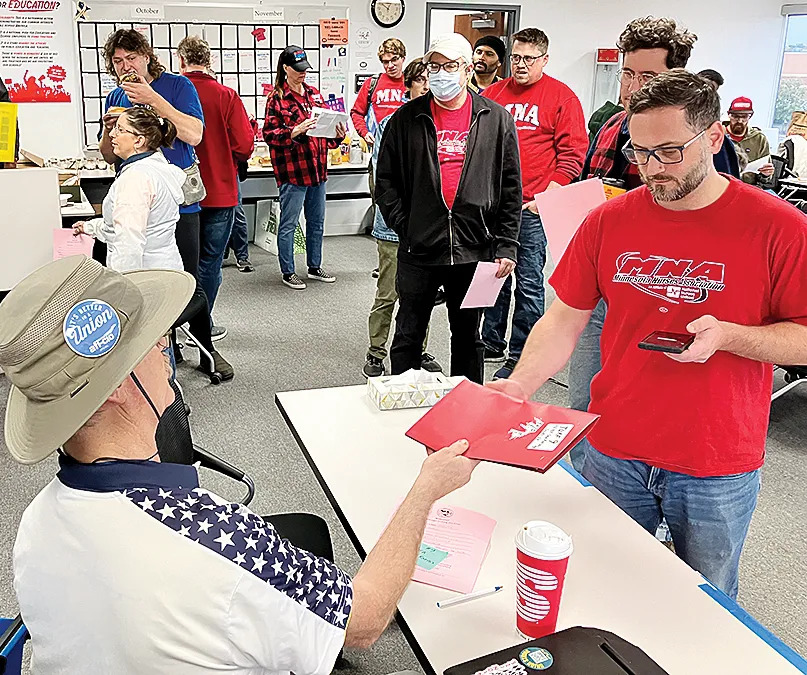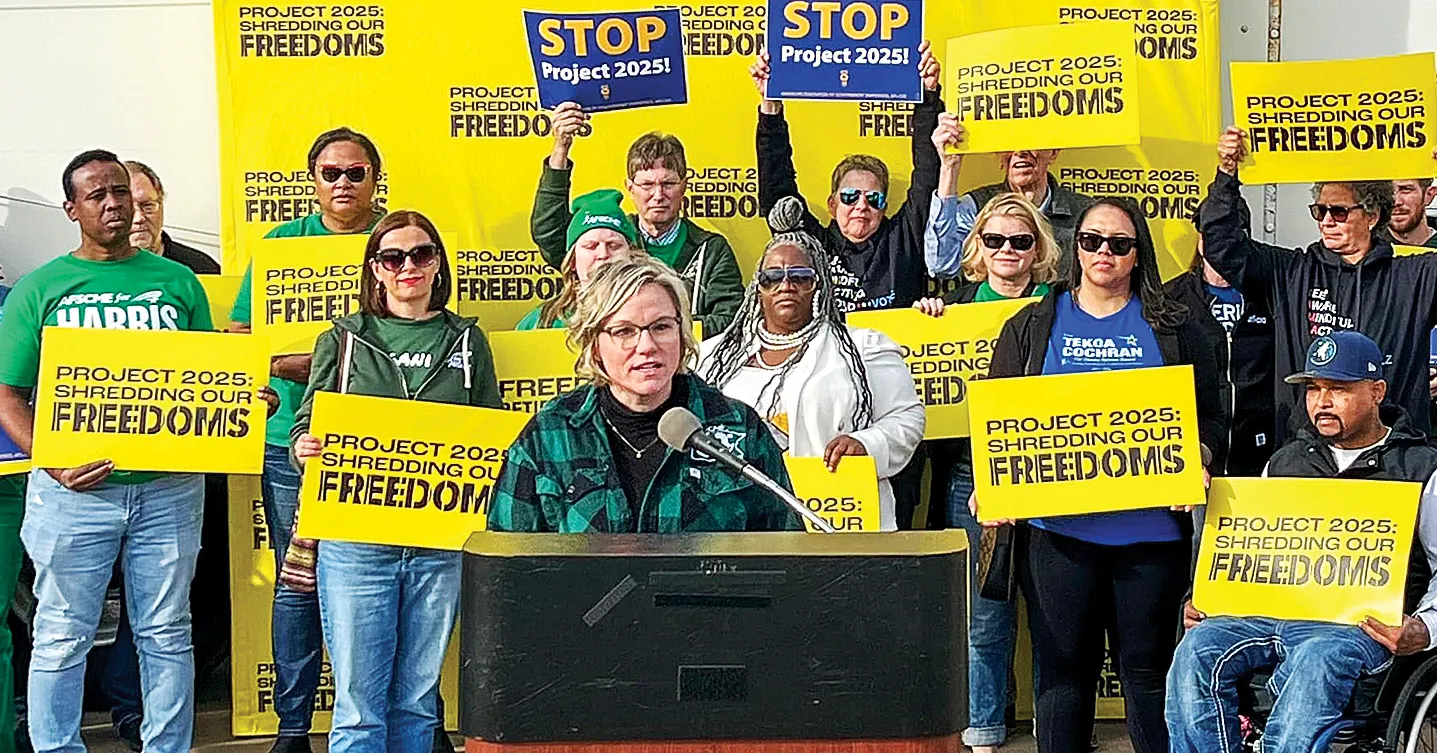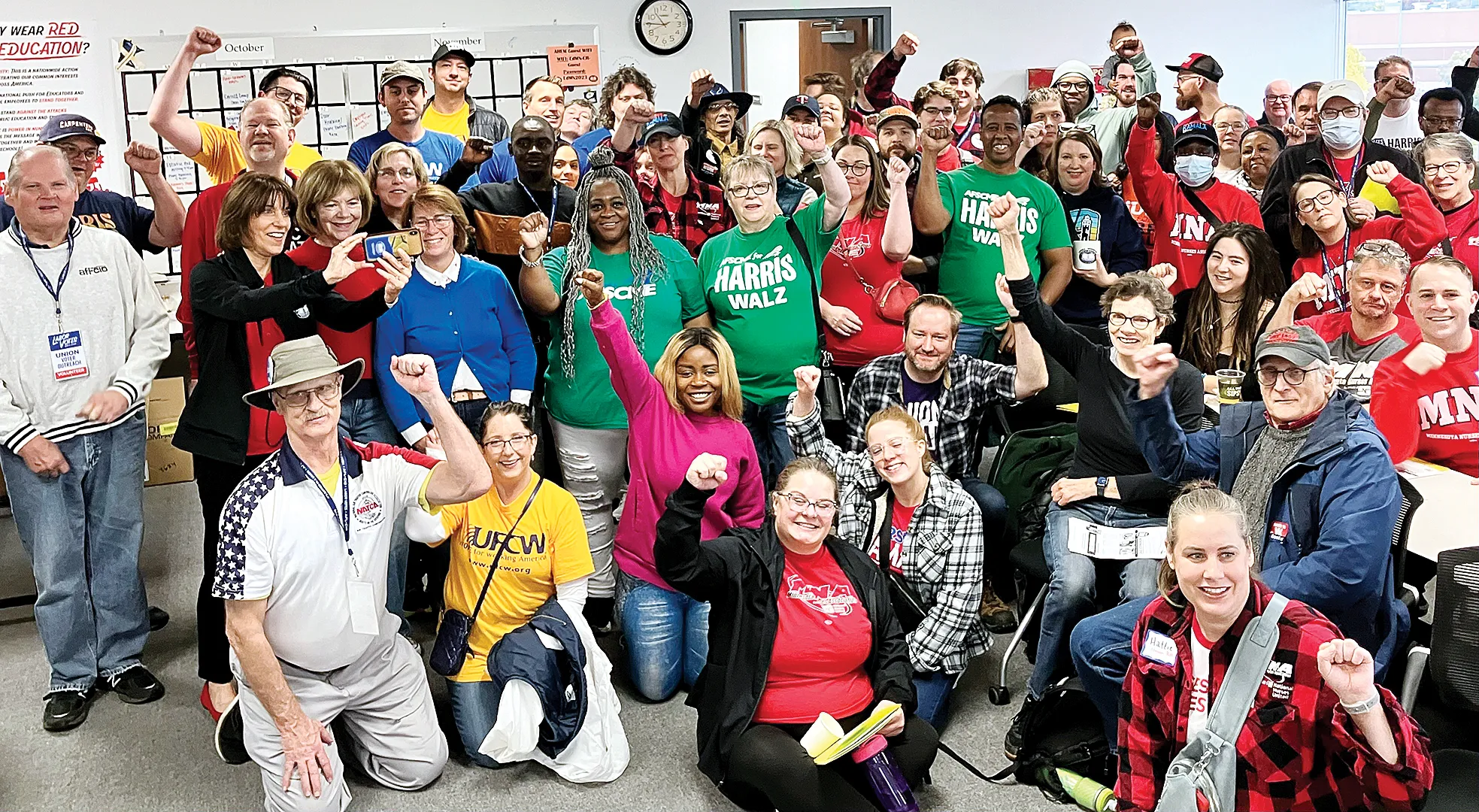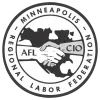RACE FOR THE WHITE HOUSE, Part 3 of 3: With clear choice for President, labor mobilizes for Harris

Photo above: Mike Esau, from the National Air Traffic Controllers Association (left), handed-out doorknocking routes to a line of Minnesota union volunteers at a Labor 2024 Day of Action October 12 in Coon Rapids. —Labor Review photo
So much is at stake. The winning candidate’s policies and staff will impact workers’ rights to unionize, to combat unfair labor practices, to uphold workplace health and safety laws, to secure prevailing wages and more.
Third in a series
By Jean Hopfensperger
Special to the Minneapolis Labor Review
MINNEAPOLIS — Feben Ghilagaber is among the surge of Minnesota union members now door-knocking for AFL-CIO endorsed candidates, but she’s bit more uneasy than her colleagues. She’s an African immigrant, raised in Minneapolis but with a foreign face and slight accent — a group of people under constant attack by former president Donald Trump.
The restaurant worker is hitting the streets both to support Vice President Kamala Harris for president and to set an example. She hopes to counteract the fake information about immigrants repeated by former president Donald Trump, who she laments spends more time attacking people than addressing workers’ needs.
“It’s very scary to go out and door-knock, with all the lies Trump is spreading about foreigners,’’ said Ghilagaber, an airport restaurant worker and member of UNITE HERE Local 17. “I feel like I need to be a voice for the voiceless. I want people to know I’m a regular person, a law-abiding citizen, that I love this country and I’m your co-worker and neighbor.’’
She added: “And I want them to know it’s crucial to vote.’’
As the November 5 election day draws near, union activists are feeling a growing sense of urgency to get out the vote, court undecided voters, and clear up confusion fueled by social media and Trump. Voters are more polarized than in decades. Union members in Minnesota — and across the nation — hope solid support by the labor movement will help push the Harris-Walz ticket over the finish line.
So much is at stake. The winning candidate’s policies and staff will impact workers’ rights to unionize, to combat unfair labor practices, to uphold workplace health and safety laws, to secure prevailing wages and more. That’s not to mention shaping the future of reproductive rights, environmental protections, immigration, taxes and health care.
The difference between Harris and Trump could not be more clear, union leaders and activists say. On one side, Harris’ career has clearly supported workers, and she was a key player in the most pro-union administration in nearly a century.
Trump, conversely, has never been a friend to labor. As president, he weakened labor regulations, gutted the National Labor Relations Board, and pursued policies that favored the wealthy over workers. And, like in 2020, even when election day has passed, it’s unclear whether he would accept a legitimate defeat.
There’s solid support among Minnesota’s union members for Harris and her vice presidential pick, Minnesota Governor Tim Walz, but the race remains too tight to predict.
“We understand that we’re struggling for every single vote,’’ said Peter Molenaar, a volunteer from Teamsters Local 970, who has been working three-hour shifts at the Minneapolis Regional Labor Federation’s phone bank at the United Labor Centre this past month. “So even if we get one vote every three hours, it’s worth it.”
Different unions, different fears
Kristine Foslien, who works in a New Brighton grocery store, is among hundreds of union members out in full force in recent weeks, door-knocking, staffing phone banks and attending rallies to build excitement for the AFL-CIO endorsed candidates. She also serves on the board of United Food and Commercial Workers Local 663, which represents workers in grocery stores, retail, meat packing and processing and more.
Like all members of all unions, she wants to be sure the right to organize, earn decent wages and benefits, and other labor priorities remain strong under the next president. But she’s particularly concerned about worker health and safety standards, especially for meat slaughterers and packers — standards that were weakened under Trump. She worries about children under 18 being permitted to work in meat plants. Trump’s current policy blueprint calls for rolling back some child labor laws.
Likewise, Trump’s talk of a massive deportation of immigrants could be a disaster for the country, she and other organizers said. That’s especially true for the millions of lower wage jobs that most Americans won’t take.
“People have a fixation on immigrants invading our country and taking away our jobs,’’ said Foslien. “But we can’t get people to work certain jobs, especially entry-level jobs.”
On a recent sunny fall morning, Foslien was knocking on doors on tree-shrouded street in Coon Rapids, part of a Minnesota AFL-CIO voter outreach blitz to union households. She dropped off leaflets and talked with folks who answered the door. On this day a Trump supporter — and first-time voter— invited her to talk on the patio.
The older woman, also a grocery worker, talked to Foslien in generalities about how the U.S. was importing too much oil. That was the main reason she supported Trump, she said. Foslien didn’t know this, but the United States produced more crude oil in 2023 than any country in the world, according to the U.S. Energy Information Administration. The woman also said she liked what Trump said about too many imports.
“I kept trying to draw the conversation back to daily life,’’ said Foslien, who walked away marveling that the woman made no connection between her union-earned wages, health benefits and pension and the Republican candidate who eroded worker rights during his term as U.S. President.

Meanwhile a few days later at the state capitol, Twin Cities labor unions organized a rally to denounce other concerns with Trump’s agenda and to reinforce support for Harris. The so-called “shred event” October 1 put the spotlight on a Trump blueprint for governing — called Project 2025 — which union speakers said would “shred” public services, family supports and union protections.
Among Project 2025’s hundreds of provisions, the proposal calls for rolling-back government regulations that protect health and safety and also cutting budgets for programs including Medicaid and food stamps.
Minnesota workers with jobs in areas such as human services, corrections, food security — programs that receive federal funding — could face job cuts, said Max Hall, director of external relations for AFSCME Council 5. That, in turn, could reduce services for the people who need them.
“They want to take away the tools we use to keep our workplaces safe, our families healthy, maintain our standard of living and ensure we have the equipment we need to make sure we go home to our families at night,’’ said Bart Andersen, executive director of AFSCME Council 5 and former bridge worker for the Minnesota Department of Transportation, addressing the crowd.
Trump’s anti-worker legacy
Steve Dilger, a retired organizer for Pipefitters Local 539, is particularly worried about labor appointments made by the next president. Dilger was a union organizer for Local 539 during the Trump administration, attempting to bring cases to the National Labor Relations Board (NLRB) for investigation. The NLRB is supposed to protect organizing rights and prevent unfair labor practices. But the anti-union people that Trump appointed to the board, and other agencies, made that almost impossible.
“It was blatantly obvious it was a waste of time,’’ said Dilger. “We just wanted people who broke the law to get consequences…. Once the Biden administration got in, we didn’t get everything we wanted. But we got a fair shake.”
While working as a union organizer, Dilger said he met labor organizers from New Jersey where Trump businesses had investments.
“They stiffed contractors in the building trades over the years,’’ Dilger said.
The USA TODAY Network, the national newspaper and its U.S. partners, investigated the Trump organizations’ failure to pay bills in 2016. The investigation found that “at least 60 lawsuits, along with hundreds of liens, judgments, and other government filings … document people who have accused Trump and his businesses of failing to pay them for their work.”
There were unpaid bills to painters, a plumber, a dishwasher, a glass company, 48 waiters, dozens of bartenders and other hourly workers, real estate brokers who sold his properties, the investigation found. Trump companies were cited for 24 violations of the Fair Labor Standards Act since 2005 for failing to pay overtime or minimum wage, the investigation found.
The Economic Policy Institute, a Washington D.C. think tank, reviewed the Trump administration’s labor record in 2020 as the election drew near.
“From President Trump’s first day on the job, his administration has systematically promoted the interests of corporate executives and shareholders over those of working people,’’ the institute reported in September 2020. “The current administration has rolled back worker protections, proposed budgets that slash funding for agencies that safeguard workers’ rights, wages, and safety, and consistently attacked workers’ ability to organize and collectively bargain.”
Harris continues a pro-labor legacy
In contrast, the AFL-CIO reports that even before Kamala Harris became vice president, she earned a lifetime score of 98 percent support for working families issues in her voting record as a U.S. Senator.
(Trump’s vice presidential running mate, J.D. Vance, received a zero percent rating from the AFL-CIO for his U.S. Senate votes as of mid-2024.)
While a US. Senator, Kamala Harris introduced a bill amending the Fair Labor Standards Act to extend overtime rights to all agricultural farmworkers working beyond 40 hours a week and ending exemptions for minimum wage and overtime for farm workers.
As California attorney general, Kamala Harris won more than a $1 million settlement from eight California car wash companies that grossly underpaid and exploited their workers. She cracked down on wage theft, signing an agreement with a Department of Labor division to more closely share information on labor violations.
In the Biden administration, Vice President Harris was a key player in some of the critical legislation supporting job creation and labor, including the historic Bipartisan Infrastructure Law and the CHIPS and Science Act. Taken together, these two major bills have brought $6 billion and 450 projects to Minnesota to date, employing thousands of construction workers and supporting a new wave of building trades apprenticeships.
The Harris platform now calls for lowering taxes for the middle class, a home ownership downpayment of up to $25,000, tax breaks for contractors who build starter homes, increased childcare assistance, and other supports to workers and families.
These all are issues that speak to UNITE Local 17 door-knocking volunteer Feben Ghilagaber and many union members. “It’s very important for people to vote for her (Harris),’’ said Ghilagaber. “The labor issues are huge. And for workers, getting a chance to buy a house is huge... Plus she is more humane (than Trump). Much more humane.”

The issue of character
The issue of Trump’s character often comes up in discussions with union members. His rhetoric is mean-spirited, they say, full of name-calling and belittling. The constant lying and stirring up anger against fellow Americans should never be the behavior of a man running for U.S. president, they said.
“He cares more about himself than the country,’’ said Kyle O’Neill, a canvasser in the Chanhassen area and IBEW Local 292 member. “I don’t understand how with a man who lies that much, this election is so close.”
And don’t forget Trump inciting a mob of his supporters who violently attacked the U.S. Capitol January 6, 2021—injuring law enforcement personnel —with four Capitol Police officers committing suicide in following days in response to the stress they experienced.
Voters can sort truth from fiction online at projects such as the non-partisan FactCheck.org, a project of the University of Pennsylvania and PolitiFact.com, an initiative of the Poynter Institute for Media Studies in Florida.
Here are a few clarifications to campaign myths circulating this year:
Myth: Harris will take away your guns.
Fact: Harris only has proposed banning assault-style weapons, a ban that had been in place from 1994 to 2004.
Myth: Trump won the 2020 election.
Fact: More than 60 court cases proved there was not widespread fraud or cheating.
Myth: Illegal immigrants come here and get Social Security.
Fact: Only people who pay into the Social Security system can receive benefits.
‘A new surge of activism’
The prospects of a Harris presidency, and dread of a second Trump administration, has galvanized community volunteers and union member volunteers.
“There’s a new surge of activism,’’ said Todd Dahlstrom, organizing director for the Minnesota AFL-CIO. “People are getting plugged in. They know what’s at stake. We want to bring this thing home.”
That’s exactly what the volunteer door-knockers who recently gathered at Anoka Hennepin Education Minnesota planned to do. At a rally before the October 5 canvassing blitz, the 60-some activists received a pep talk from Randi Weingarten, national president of the American Federation of Teachers. She reminded them of the stark difference between the Trump and Biden-Harris administrations, and of their role as “agents of hope.”
“We will win this race by inches, not by yards,’’ Weingarten told the crowd. “And when we do, your governor will be the vice president of the United States.’’
This story is part three of a three-part series reported for the Labor Review by Jean Hopfensperger, a retired member of the Minnesota Newspaper Guild who worked 35 years as a reporter at the Star Tribune.
For the other two stories in the series:
The Race for the White House: Part 1
Unions shift gears for a new race for White House
The Race for the White House: Part 2
Workers, families are focus of Harris-Walz agenda
The Trump vs. Harris record on labor issues: No contest
| The Donald Trump labor record | The Kamala Harris labor record |
|
|
Want to know more about the Trump and Harris labor records?
Visit betterinaunion.org/candidate-comparison
Help Get-Out-The-Vote!
Go to https://aflcio.mn/gotv24 to find
doorknocks and phonebanks near you.
When you register, look for the question asking, "Are you a union
member?" Use the pull-down menu to select your union.

